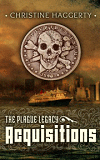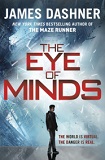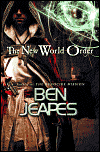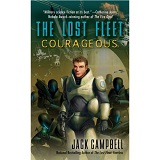Little Brother, by Cory Doctorow
Book Review by Adam P. Knave
Have you read this book?
(Please note at the end of the review is a special treat for readers of SFReader...)
I read a lot of books. Ya, what does this have to do with a review? Everything. I'll get there. I read about a book a week these days, and have always read so many books I have not only run out of bookshelf space several times over in my life but I have spent more on bookshelves than I have on any other bit of office furniture.
Most of the books I read are good. Some are bad. Very very few are Important.
Little Brother is Important.
See, I needed to build that up a bit so you would understand that I don't toss that around lightly. Sure, I can tell you it is the best book I've read in at least two years (it is) but the secret here is its importance.
And now let's actually discuss this beastie for a bit. Little Brother is the newest offering from Cory Doctorow. Plot wise it is fairly simple. Marcus Yallow is a seventeen year old living in San Francisco. He's smart. Not Barry Ween smart, just normal smart kid smart. The kind of smart that gets you in to trouble when you're seventeen. It's also the kind of smart that gets you out of trouble at seventeen.
Marcus uses those smarts to dodge and weave around his high school's security system - enabling him to IM friends and play a few games during school. It also lets him skip class when he needs to.
Now, you need to understand this story takes place in the future. It's the future of Ten Minutes From Now. Everything is here already, but the way some technology is implemented is occasionally new, but none of it is made up. None of it. We'll get back to the Ten Minutes From Now Future stuff in a minute. Let's keep going with the story.
Markus and friends end up exactly where they shouldn't be during a terrorist attack on San Francisco. Which makes it sound like something collapses on them. It does. The Dept. of Homeland Security, in fact.
Wrong place, wrong time - that's all it takes to kiss your life goodbye. Before you stop reading and think your politics make you someone who won't enjoy this book, I tell you to hold on. Doctorow is not preaching here. He's simply stating fact. If the DHS thinks you're a suspect then by God you are a suspect. And if the DHS wants to hold you, to interrogate, mess with and otherwise deal with you then they simply will. That's their job.
Except it is and it isn't. And that's where the book really starts to shine. Because sometimes the DHS gets the wrong guy. We've seen it in the news. It happens. But the DHS isn't good at letting go or admitting mistakes. Add to that that in the aftermath of a major terrorist attack security everywhere is amped up beyond rational belief and you have something.
Because Marcus realizes an important fact: You shouldn't have to be afraid of your Government. The gov doesn't always agree, and before you shout at it, look at the news and think for a second. How rational is the world you live in? How much are you willing to trade for a sense of security? What about when that same sense of security can't even be proven to work? What freedom are you willing to lose on a faceless organization's say so?
Marcus stares down those questions and he finds his answers. He shouldn't have to be afraid of his own Government. And so he goes out to do something about that.
Now that's, on the one hand, the book. That story right there. There is, of course, far more to it, but on the face of it that's your starting gate. And lord that is a hard story to tell.
See, you can preach about whichever side you feel you're on. Doctorow doesn't make that mistake. Both sides are given a chance to state arguments, organically in the novel. You can also make the mistake of hashing politics instead of telling a story. This book doesn't trip on that, either. The story is gripping and at turns exciting, heartfelt and emotionally powerful.
Doctorow, in his roles as co-editor of Boing Boing (the most read blog on the Internet, yes all of it) and activist and writer finds himself in a perfect position to use what he knows of culture, internet and cutting edge, as well as technology to make this book fairly sing with correct terminology, wit and charm. It feels of the moment because it is of the moment. It is, in fact, about the moment.
Now let's cut back to Ten Minutes From Now Future stuff. Futurists are plenty in the writing field. Most of them extrapolate big things from small and find new paths they feel will make sense from current ones. Doctorow, like William Gibson, nails the Ten Minutes From Now Future, the future that is made of the world outside given only a few moments of time in which to advance. Nothing new is added, only used in slightly new ways. Generally they are ways that this stuff is already headed. But it is in the writing, in the use and the feel that it can be made to feel like The Future, with an Science Fiction capital F. Both grounding and souring, the Ten Minutes From Now Future is a powerful tool, and one that very few people can use correctly.
So let's shoot all the way back to the start of this review: why is this book Important?
It's targeted at YA audiences. This is the type of book that, like the old Heinlein juvies, is designed to make kids want to read, and want to know things. It tickles that part of the brain that made me, as a kid, want to learn more about physics and math and space when I read Have Spacesuit, Will Travel. That's an achievement. That's Importance. This is a book that could change someone's life.
So I urge you: Buy this book. Read it, digest it, enjoy the hell out of it. Then give it to a teenager you know. Let the Importance spread like wildfire.
And now for your treat! Over at the footnote we have arranged for an interview with Mr. Doctorow to run concurrently with this review! So head over there and read that as a follow-up!
I read a lot of books. Ya, what does this have to do with a review? Everything. I'll get there. I read about a book a week these days, and have always read so many books I have not only run out of bookshelf space several times over in my life but I have spent more on bookshelves than I have on any other bit of office furniture.
Most of the books I read are good. Some are bad. Very very few are Important.
Little Brother is Important.
See, I needed to build that up a bit so you would understand that I don't toss that around lightly. Sure, I can tell you it is the best book I've read in at least two years (it is) but the secret here is its importance.
And now let's actually discuss this beastie for a bit. Little Brother is the newest offering from Cory Doctorow. Plot wise it is fairly simple. Marcus Yallow is a seventeen year old living in San Francisco. He's smart. Not Barry Ween smart, just normal smart kid smart. The kind of smart that gets you in to trouble when you're seventeen. It's also the kind of smart that gets you out of trouble at seventeen.
Marcus uses those smarts to dodge and weave around his high school's security system - enabling him to IM friends and play a few games during school. It also lets him skip class when he needs to.
Now, you need to understand this story takes place in the future. It's the future of Ten Minutes From Now. Everything is here already, but the way some technology is implemented is occasionally new, but none of it is made up. None of it. We'll get back to the Ten Minutes From Now Future stuff in a minute. Let's keep going with the story.
Markus and friends end up exactly where they shouldn't be during a terrorist attack on San Francisco. Which makes it sound like something collapses on them. It does. The Dept. of Homeland Security, in fact.
Wrong place, wrong time - that's all it takes to kiss your life goodbye. Before you stop reading and think your politics make you someone who won't enjoy this book, I tell you to hold on. Doctorow is not preaching here. He's simply stating fact. If the DHS thinks you're a suspect then by God you are a suspect. And if the DHS wants to hold you, to interrogate, mess with and otherwise deal with you then they simply will. That's their job.
Except it is and it isn't. And that's where the book really starts to shine. Because sometimes the DHS gets the wrong guy. We've seen it in the news. It happens. But the DHS isn't good at letting go or admitting mistakes. Add to that that in the aftermath of a major terrorist attack security everywhere is amped up beyond rational belief and you have something.
Because Marcus realizes an important fact: You shouldn't have to be afraid of your Government. The gov doesn't always agree, and before you shout at it, look at the news and think for a second. How rational is the world you live in? How much are you willing to trade for a sense of security? What about when that same sense of security can't even be proven to work? What freedom are you willing to lose on a faceless organization's say so?
Marcus stares down those questions and he finds his answers. He shouldn't have to be afraid of his own Government. And so he goes out to do something about that.
Now that's, on the one hand, the book. That story right there. There is, of course, far more to it, but on the face of it that's your starting gate. And lord that is a hard story to tell.
See, you can preach about whichever side you feel you're on. Doctorow doesn't make that mistake. Both sides are given a chance to state arguments, organically in the novel. You can also make the mistake of hashing politics instead of telling a story. This book doesn't trip on that, either. The story is gripping and at turns exciting, heartfelt and emotionally powerful.
Doctorow, in his roles as co-editor of Boing Boing (the most read blog on the Internet, yes all of it) and activist and writer finds himself in a perfect position to use what he knows of culture, internet and cutting edge, as well as technology to make this book fairly sing with correct terminology, wit and charm. It feels of the moment because it is of the moment. It is, in fact, about the moment.
Now let's cut back to Ten Minutes From Now Future stuff. Futurists are plenty in the writing field. Most of them extrapolate big things from small and find new paths they feel will make sense from current ones. Doctorow, like William Gibson, nails the Ten Minutes From Now Future, the future that is made of the world outside given only a few moments of time in which to advance. Nothing new is added, only used in slightly new ways. Generally they are ways that this stuff is already headed. But it is in the writing, in the use and the feel that it can be made to feel like The Future, with an Science Fiction capital F. Both grounding and souring, the Ten Minutes From Now Future is a powerful tool, and one that very few people can use correctly.
So let's shoot all the way back to the start of this review: why is this book Important?
It's targeted at YA audiences. This is the type of book that, like the old Heinlein juvies, is designed to make kids want to read, and want to know things. It tickles that part of the brain that made me, as a kid, want to learn more about physics and math and space when I read Have Spacesuit, Will Travel. That's an achievement. That's Importance. This is a book that could change someone's life.
So I urge you: Buy this book. Read it, digest it, enjoy the hell out of it. Then give it to a teenager you know. Let the Importance spread like wildfire.
And now for your treat! Over at the footnote we have arranged for an interview with Mr. Doctorow to run concurrently with this review! So head over there and read that as a follow-up!
|
Click here to buy Little Brother, by Cory Doctorow on Amazon
|
Little Brother, by Cory Doctorow on Amazon
| More Books You Might Like |
Comment on Little Brother, by Cory Doctorow




